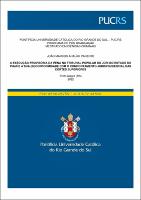| Share record |


|
Please use this identifier to cite or link to this item:
https://tede2.pucrs.br/tede2/handle/tede/11486| Document type: | Dissertação |
| Title: | A execução provisória da pena no tribunal popular do júri do estado do Piauí e a sua (in)conformidade com o comportamento jurisprudencial das cortes superiores |
| Other Titles: | The execution of the sentence in the popular court of the jury ps the state of Piauí anda its (un)conformity with the jurisprudential behavior of the superior courts |
| Author: | Parente, João Marcos Araújo  |
| Advisor: | Sohngen, Clarice Beatriz da Costa |
| Abstract (native): | Com a edição da Lei n°. 13.964/2019, chegou ao ordenamento jurídico brasileiro o artigo 492, inciso I, alínea “e” do Código de Processo Penal. Esse dispositivo se contrapõe à redação do Art. 283 do mesmo repositório, o qual foi declarado constitucional recentemente por intermédio dos julgamentos das ADC’s n. 43, 44 e 54. Esse paradoxo cria grave insegurança jurídica, possibilitando o surgimento de decisões antagônicas. No presente trabalho, além de ter sido realizada, inicialmente, a contextualização histórica que permitiu o surgimento do artigo. 492, I, “e” do CPP, realizou-se sua análise sob um prisma constitucional, verificando-se a sua incompatibilidade com a Carta Constitucional de 1988. Com a finalidade de verificar como estava a aplicação da citada disposição na prática, realizou-se pesquisa jurisprudencial no Estado do Piauí, no STJ e no STF, tendo sido verificado, em caráter majoritário, nos dois primeiros, que a referida disposição legal não vem sendo aplicada pelo Poder Judiciário nos órgãos analisados, pois os julgadores entendem que ela afronta o que foi recentemente decidido pelo STF nas ADC’s n°. 43, 44 e 54. No âmbito da Suprema Corte, no entanto, a questão é mais tormentosa, tendo em vista que o julgamento do RE n°. 1.235.340 tem indicado a possibilidade de uma “guinada jurisprudencial”, com o reconhecimento da constitucionalidade do mencionado dispositivo. Desse modo, o presente trabalho se debruçou tanto sobre uma análise teórica da matéria, com o enfrentamento do prisma constitucional do artigo em debate, como propôs, também, a realizar uma pesquisa jurisprudencial sobre o tema, catalogando e documentando os principais posicionamentos pretorianos sobre a aplicação do referido dispositivo legal |
| Abstract (english): | With the enactment of Law n°. 13.964/2019, article 492, item I, item “e” of the Code Of Criminal Procedure arrived in the Brazilian legal system. This device is opposed to the wording of Art. 283 of the same repository, which was recently declared constitutional through the judgments od ADC’s n. 43, 44 and 54. This paradox creates serious legal uncertainly, allowing the emergence of antagonistic decisions. In the present work, in addition to the historical contextualization that allowed the emergence of the article, it was initially carried out 492, I, “e” of the CPP, its analysis was carried out under a constitutional prism, verifying its incompatibility with the Constitutional Charter of 1988. In order to verify how the application of the aforementioned provision was in practice, it was jurisprudence research is carried out in the State of Piauí, in the STJ and in the STF, having been verified, in a majority character, in the first two, that the referred legal disposition has not been applied by the Judiciary Power in Organs analyzed organs, since the Judges understand that it affronts the which was recently decided by the STF in ADC’s n°. 43, 44 and 54. Within the scope of the Supreme Court, however, the issue is more tormenting, considering that the judgment of RE n°. 1.235.340 has indicated the possibility of a “jurisprudential shift”, with the recognition of the constitutionality of the aforementioned device. In this way, the present work focused both on a theoretical analysis of the matter, with the confrontation of the constitutional prism of the article under debate, and also proposed to carry out a jurisprudential research on the subject, cataloging and documenting the main praetorian positions of the application of said legal provision. |
| Keywords: | Execução Antecipada da Pena Presunção de Inocência Duplo Grau de Jurisdição Constitucionalidade Early Execution of Sentence Presumption of Innocence Double Degree of Jurisdiction Constitutionality |
| CNPQ Knowledge Areas: | CIENCIAS SOCIAIS APLICADAS::DIREITO |
| Language: | por |
| Country: | Brasil |
| Publisher: | Pontifícia Universidade Católica do Rio Grande do Sul |
| Institution Acronym: | PUCRS |
| Department: | Escola de Direito |
| Program: | Programa de Pós-Graduação em Ciências Criminais |
| Access type: | Acesso Aberto |
| Fulltext access restriction: | Trabalho não apresenta restrição para publicação |
| URI: | https://tede2.pucrs.br/tede2/handle/tede/11486 |
| Issue Date: | 26-Nov-2022 |
| Appears in Collections: | Programa de Pós-Graduação em Ciências Criminais |
Files in This Item:
| File | Description | Size | Format | |
|---|---|---|---|---|
| JOAO_MARCOS_PARENTE_DISS.pdf | JOÃO_MARCOS_ARAÚJO_PARENTE_DIS | 1.03 MB | Adobe PDF |  Download/Open Preview |
Items in DSpace are protected by copyright, with all rights reserved, unless otherwise indicated.




